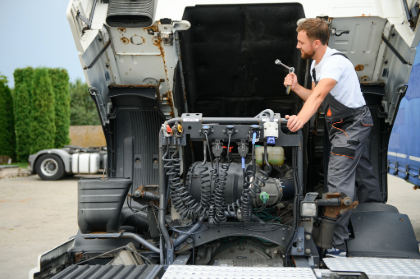INDEPENDENT DEALER
Myrtle Beach, SC | (336) 247-0212
High Point, Greensboro & Mooresville, NC
OUR BLOG
Learn essential diesel engine maintenance tips for summer from Mooresville Synthetic Oil in High Point, NC. Protect your investment with these expert recommendations.

As summer temperatures rise, your diesel-powered vehicle faces unique challenges that demand special attention. Proper maintenance isn't just about preventing breakdowns—it's about extending engine life, improving fuel efficiency, and maintaining performance during the hottest months of the year. Let's explore how to keep your diesel running optimally this summer.
Mooresville Synthetic Oil in High Point, NC, offers products like AMSOIL Signature Series 15W-40 100% Synthetic Max-Duty Diesel Oil to care for your engine. Call (336) 247-0212 today to speak with our diesel specialists about your maintenance needs, or visit AMSOIL's online store to explore our complete line of diesel-specific solutions.
Why Proper Maintenance Matters for Diesel Owners
Diesel engines are known for their durability and longevity, but this reputation only holds true with consistent care. Unlike gasoline engines, diesels operate under higher compression ratios and generate more torque, putting additional stress on components. Regular maintenance prevents the premature wear that can lead to costly repairs and downtime.
Summer heat compounds these stresses. High temperatures can affect fuel volatility, reduce cooling system efficiency, and accelerate oil breakdown. However, a well-maintained diesel engine can easily handle these challenges, providing reliable service even during July and August heat waves.
Essential Diesel Engine Maintenance Checklist for Summer
Creating a summer maintenance routine for your diesel vehicle ensures optimal performance when temperatures climb. Focus on these critical areas:
- Check cooling systems weekly: Inspect coolant levels and look for leaks or damaged hoses
- Monitor air intake systems: Replace air filters more frequently during dusty summer conditions
- Test batteries regularly: Heat accelerates battery deterioration
- Inspect belts and hoses: Look for cracks, fraying, or other signs of wear
- Check tire pressure often: Heat increases pressure and affects fuel economy
Following this checklist helps prevent the most common summer-related diesel engine failures, keeping you on the road instead of on the shoulder.
Cooling System Care: Your First Line of Defense
Your diesel's cooling system becomes your most critical maintenance point during the summer months. Unlike gasoline engines, diesels generate significantly more heat during normal operation, making an efficient cooling system essential.
Start by checking coolant quality. Degraded coolant loses its anti-corrosive properties and can allow scale buildup in radiators and water jackets. Follow manufacturer guidelines for coolant type and change intervals, but consider more frequent changes if you operate in extreme conditions.
Next, inspect the radiator and intercooler for debris and blockages. Even minor restrictions can cause temperature spikes during hot weather operation. Clean these components carefully, using compressed air rather than pressure washing to avoid damaging delicate fins.
Confused about the best maintenance approach for your diesel vehicle? The team at Mooresville Synthetic Oil in High Point, NC, specializes in diesel engine care and can guide you to the optimal maintenance program for your specific needs. Call (336) 247-0212 for personalized recommendations, or browse our complete selection at AMSOIL's online store.
Fuel System Protection in Hot Weather
Summer heat affects diesel fuel in several ways. Higher temperatures can accelerate sludge formation in fuel tanks and cause water condensation issues. Implement these protection measures:
- Use a quality fuel additive designed for summer conditions
- Keep tanks as full as possible to reduce condensation
- Drain water separators more frequently
- Consider upgrading to finer-micron fuel filters during summer
Properly maintained fuel systems prevent breakdowns, improve fuel economy, and reduce emissions, which is particularly important during summer when air quality is often compromised.
Air Filtration: The Overlooked Maintenance Item
Summer brings dust, pollen, and road debris that can quickly clog air filters. A restricted air filter forces your engine to work harder, reducing power and increasing fuel consumption. During peak summer months, check air filters bi-weekly and clean or replace as needed.
Pay special attention to the entire intake system, including turbocharger components. Heat-related expansion and contraction can loosen clamps and connections, creating boost leaks that hamper performance and potentially damage sensitive sensors.
Synthetic Oil: Your Engine's Summer Ally
Perhaps the most critical element in diesel engine maintenance is choosing the right oil. Conventional oils break down faster in extreme heat, losing their protective properties when your engine needs them most. Premium synthetic oils maintain viscosity across a wider temperature range and resist thermal breakdown.
Consider increasing oil change frequency by 10-15% during summer months, especially if you frequently idle in traffic, tow heavy loads, or operate in dusty conditions. The small investment in more frequent oil services pays dividends in extended engine life.